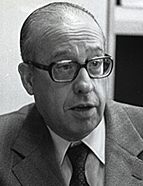

His secondary school years, at Liceu Gil Vicente in Lisbon also began on a strong footing, where Câmara Reis and Newton de Macedo featured among some of the teachers he would never forget. Moreover, as a young man he sported the company of Seara Nova intellectuals, particularly António Sérgio. Citizenship and scholarly learning were always intimately intertwined. And it was precisely in Seara Nova that he published his first article, a review of a novel by Joaquim Leitão, a writer who has nowadays fallen into oblivion.
As a result of this stimulating camaraderie, particularly with Newton de Macedo, he completed secondary school at Liceu Pedro Nunes in Lisbon, after which he enrolled in the Ciências Histórico-Filosóficas [History and Philosophy of Science] first degree at the Faculdade de Letras [Faculty of Arts]. Utter disappointment. “That old building, which could only be accessed by descending a flight of steps, as shown by Rodrigues Lapa, who was therefore forced to leave, if he wished to keep his dignity; against a mental background of musty 19th-century positivism (nevertheless respectable when confronted with the ensuing cacophony) which numbed academic proximity, the yearning for philosophy dissipated and no stimulus was left for research.” This was not perceived negatively by Magalhães Godinho, quite the opposite: “We had the privilege of not having learned a single thing at university and so we were able to prepare ourselves as we saw fit.” He behaved as an “independent marksman”, teaching himself remotely while in close contact with the great masters, some of which he lists: Pirenne, Marc Bloch, Lucien Febvre, La Blache, Gordon Childe, Brunschvicg, Goblot, Pierre Janet, Piaget, Paul Guillaume, and so many, many others. And one must not forget his Portuguese masters, such as Jaime Cortesão, at the time exiled first in France and later in Brazil, António Sérgio and Duarte Leite and later, Veiga Simões.
His philosophical reflection gave birth to his first-degree dissertation Razão e História [Reason and History] after which he trained to become a high school teacher; he then joined the History group at the Faculdade de Letras as Professor Extraordinário1 “by friendly persuasion of archaeologist Manuel Heleno.” This marked the beginning of a career in History where his teaching responsibilities involved lecturing a great number of subjects: Oriental History, Classical History, Modern and Contemporary, General History of Civilization, Numismatics... while also having to teach practical classes (and the theoretical classes of a frequently absent Full Professor). The excessive workload at a time when professorships were scarce hindered early specialization and fostered comparativity.
1 Not a permanent staff member
